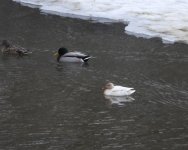zerb21
Bruce Moorman
I saw this unknown pale duck in North Hydro Park that's located in southeast Michigan, USA on February 10, 2022. It was swimming in the Huron River with other ducks that included Mallards, American Black Ducks, Redheads, Ring-necked Ducks, Common Goldeneyes, Common Mergansers, Hooded Mergansers, and a female Northern Pintail. It looked just a bit smaller than the Mallards that were near it. Thank you for any help identifying it.







